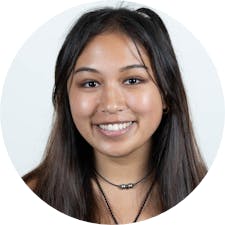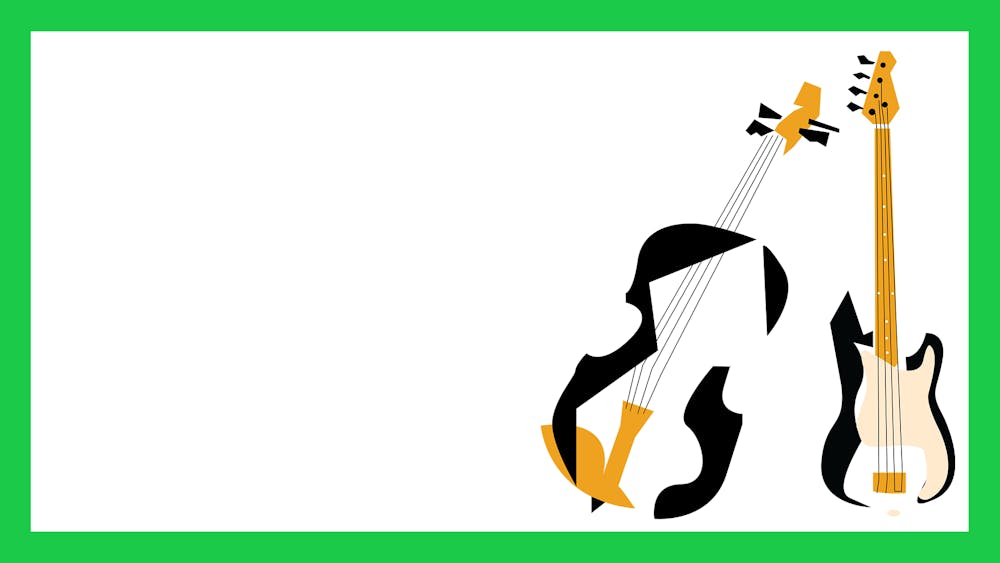As a single mother with a full-time job, Ty Seibel needed to find a safe and affordable place for her then-8-year-old daughter to be throughout the day over the summer.
Harmoniously, she found Girls Rock! Phoenix in its first year of operation when she saw a screening of a Girls Rock Camp Alliance documentary at the local Changing Hands Bookstore.
Girls Rock! Phoenix is a nonprofit organization that provides girls and gender nonconforming kids access to music education.
Inspired by the women in punk rock from her formative years, Seibel signed her daughter up.
"When I saw that there was a camp coming to town that promoted the sort of ethos that women in rock that I grew up with were all about, I was really excited," she said.
But underlying summer camp fees lingered. At the time, Seibel was unable to afford a lot of things, including the price of a summer camp.
"If you're a single working parent or even a family with a certain income threshold, it's really hard to make stuff like that happen," she said.
Luckily, Girls Rock! Phoenix has fees on a sliding scale, meaning families in situations like Seibel's only pay what they're able to based on their income.
"I feel strongly that offering opportunities like that to families that may not otherwise be able to afford them is really important," she said. "Now that I am in a position where I can afford something like that, I'm very excited to pay more than I can afford to help those who can't afford it."
She added that Girls Rock! Phoenix teaches "the kinds of things that we want girls and gender nonconforming kids to learn, so that they feel empowered and brave and like they can take up space."
Women in music
Despite the raging popularity of female artists like Taylor Swift, Rihanna and Beyoncé, women in the music industry are still largely underrepresented.
From 2012 to 2021, about one in five top music artists were women, according to USC Annenberg Inclusion Initiative's "Inclusion in the Recording Studio?" study. As for music careers behind the scenes, 12.7% of songwriters were women and 2.8% of producers were women.
"In an industry where women's skills are discounted and they are sexualized or fearful for their safety, the popular charts reflect the reality that women's contributions are minimized and they continue to be sexualized and stereotyped by their colleagues," the study said.
Alexis Edmonds, the community coordinator at Girls Rock! Phoenix, said women are often expected to play a specific role in the music industry.
"It comes down to the tone that people talk about the musicians with," she said. "It seems like men and masc-presenting people never really have their space that they take up in the community questioned, and women have to fight for so much more."
To combat these barriers, local music organizations are working to provide women and gender nonconforming individuals better access and opportunities to help them enter and succeed in the industry.
Beats by Girlz
Beats by Girlz is a worldwide organization that empowers "the next generation of women and gender-expansive people through music and technology," according to its website.
Founded by Erin Barra-Jean, the director of ASU's popular music program, Beats by Girlz has about 35 chapters from Malawi to Turkey to El Salvador.
"(Beats by Girlz) was born out of the sad reality that there was nobody that looked like me that was working in music production or music technology," she said. "We just want women and gender minorities to be able to do anything they want. And the tools that we're using are technology and music. When you can pair a creative skill set with a technical skill set and communication skills, you can have any job in the world. And we want women to have jobs in the future."
The organization started in 2013 with Barra-Jean in New York City teaching beat making to kids through online videos and curriculum. Then she expanded to doing classes and summer camps through The Lower Eastside Girls Club while fundraising through Indiegogo, a crowdfunding website.
"I think the reason why we've grown so much, and in so many places, is that … this is a very saturated area to be working in right now," Barra-Jean said. "And instead of everybody creating their own nonprofit, if you want to have impactful work, we'll be in the business of helping people help themselves."
Now, the organization is able to support its chapters and local communities by helping them fundraise, providing music curriculum and giving them access to music technology through partners like Ableton, a music software company.
With chapters at places like Phoenix Conservatory of Music and ASU, their programming spans kindergarten to adulthood.
"It's very education-based at (the K-12) level," Barra-Jean said. "Then at the college level … there's a lot of community work that plays into it, like let's all be together and create spaces and communities that are for us and by us and meant for us. … At the community level and for adults, it's much more workshops, networking opportunities and professional development."
Barra-Jean added that it's important that her program is holistic and contiguous because oftentimes music education disappears after grade 12 or after college.
Beats by Girlz at ASU is the only college-specific chapter. Stemming from chapter lead Kailin Kentigian's dream to start a music organization for women, Beats by Girlz ASU began last August.
"I wanted to create an opportunity for not only myself, but for other people on campus to have experience in the industry without having to be there in any of those main (Beats by Girlz chapters)," the junior studying project management said.
"This is the age group when we have our entire world ahead of us and we sometimes need an extra push to feel what (our passions and interests) are," said Anna Dale, Beats by Girlz ASU's communications director and a junior studying microbiology and music performance.
After only being active for less than a year, Beats by Girlz ASU has held curriculum meetings, social meetings and a fundraiser.
"A lot of hobbies are so competitive now," Kentigian said. "Think about dance or sports — if you're not into it by the age of 10, good luck trying to get on any team. So learning a new skill, picking up a new hobby, finding a new passion kind of feels impossible."
Although this makes the ASU chapter unique, Barra-Jean said Beats by Girlz is about empowerment, and that the issues women getting into music face overlap with broader problems.
The world "has been made to accommodate men," Barra-Jean said. "When you have to navigate a culture or a community where you're othered or you don't have people who are like you to support you, that colors everything — from the way you enter a room to how you're treated to the way that you're gonna act.
"And that gets layered beyond gender. There's sexuality, there's race … it's not just a gender issue. It's highly intersectional."
"One of our goals is giving people the platform to pursue their passions, especially marginalized identities — that's what we are here for," Kentigian said. "Another one of our goals is to give people opportunity — help them pursue their passions and find a new hobby."
Girls Rock! Phoenix
Seibel, ASU's assistant director of communication at Academic Enterprise Communications, currently serves on the board for Girls Rock! Phoenix. Her 14-year-old daughter is looking forward to returning to the organization's first summer camp since 2019.
Campers go on a one-week retreat to dip their toes into the music industry. They can choose between voice, guitar, bass, drums or keyboard; if they choose an instrument, they are issued one for free.
Aside from music classes, Girls Rock! Phoenix holds self-defense, self-care, storytelling, poetry and zine-making workshops. Seibel said the camp experience is both inspiring and enriching as she shared the account of her daughter's first experience at camp in 2017.
On the first day of camp, Seibel said her daughter went to her dad's house and wanted him to pull out records of female-led punk rock bands like Sleater-Kinney and Bikini Kill. "She wanted him to pull all those out so she could start exploring them," she said. She also recalled her daughter wanting to cut her hair and being encouraged by the organization to experiment and be creative through music.
"She also would come home with these little index cards with a musician's name on it — the one that sticks out to me is Sister Rosetta Tharpe — and she would want to research who this is," Seibel said. "It was just really exciting to see her so interested in the women in rock that came before us."
At the end of the week, girls learn how to make a logo for their bands and screen-print it onto t-shirts they can wear for their final showcase — the pinnacle of summer camp.
"One of the benefits that (my daughter) got was she felt like she could get loud on stage and really command an audience," Seibel said. "And I think she caught the fact that the bandmates were so encouraging, and the women who volunteer at this camp are incredible. … So even if she messed up or forgot something, it didn't matter. She was supported."
Aside from camp, the organization hosts open mic nights and karaoke parties throughout the year.
"We really try to create as diverse and robust as a community as possible, so recruiting is a huge part of the work that we do, so that we can have a community in our camp that represents the community that we see around us in the greater Phoenix area," Edmonds said.
"Just like in so many other areas of life, it's always important to show girls and gender nonconforming people that our voices matter and that we can speak up and that we can take up space in all different types of communities."
Edited by Sam Ellefson, Camila Pedrosa, Alexis Moulton and Greta Forslund.
This story is part of The Spectrum Issue, which was released on April 5, 2023. See the entire publication here.
Reach the reporter at savannah.dagupion@gmail.com and follow @savdagupion on Twitter.
Like State Press Magazine on Facebook, follow @statepressmag on Twitter and Instagram and read our releases on Issuu.

Savannah is a senior studying journalism with a minor in English. This is her eighth semester with The State Press. She has also worked at the Lonely Planet and Write On Downtown.




